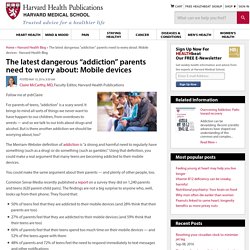

Addiction, concentration, performance… ce que l’on sait (ou pas) des effets du smartphone. La recherche est encore balbutiante sur les effets de l’hyperconnexion aux smartphones, un phénomène récent à l’échelle de l’histoire de l’humanité.

LE MONDE | • Mis à jour le | Par Céline Mordant Il y a dix ans, le 9 janvier 2007, le patron d’Apple, Steve Jobs, présentait le premier iPhone. Depuis, le « téléphone intelligent » s’est imposé dans notre quotidien, dans nos poches, nos mains. On l’éteint rarement, on ne le quitte plus… Aurait-il refaçonné notre façon de penser ? Que disent les neurosciences des effets de cette hyperconnexion sur notre cerveau ? Dans le flot des études et publications parfois contradictoires qui dressent soit une inquiétante liste des dégâts, soit une ode très optimiste aux facultés d’adaptation de l’être humain, difficile de s’y retrouver. Peut-on devenir dépendant à son smartphone ? La plupart d’entre nous ont le sentiment de maîtriser entièrement son rapport à son smartphone. Le téléphone portable rend-il plus performant ? Pas vraiment. Jeux vidéo : une étude rassurante pour les enfants. À raison de deux heures par semaine, les jeux vidéo destinés aux enfants sont plutôt bénéfiques, selon une récente étude.

Près de 60 ans après l'invention du premier jeu vidéo («Tennis for two», 1958), éducateurs, pédopsychiatres et parents s'interrogent toujours sur l'impact des jeux vidéo sur les enfants. Récemment, des chercheurs espagnols en neurosciences ont évalué le comportement et les capacités motrices et cognitives de 2440 enfants de Barcelone, âgés de 7 à 11 ans. Leurs résultats, publiés en septembre dans la revue Annals of Neurology, montrent que les as de la manette présentent un meilleur temps de réaction aux stimuli que ceux privés de console, ainsi que de meilleurs résultats scolaires. Sur l'ensemble des participants, 82% jouaient au moins une heure par semaine, avec une moyenne de 4 heures hebdomadaires.
Mauvaise conduite Ces résultats ne signifient pas pour autant que les jeux vidéo sont à l'origine de ces problèmes de comportement. Dépassionner le débat. The latest dangerous "addiction" parents need to worry about: Mobile devices. Follow me at @drClaire For parents of teens, “addiction” is a scary word.

It brings to mind all sorts of things we never want to have happen to our children, from overdoses to arrests — and so we talk to our kids about drugs and alcohol. But is there another addiction we should be worrying about, too? The Merriam-Webster definition of addiction is “a strong and harmful need to regularly have something (such as a drug) or do something (such as gamble).”
Using that definition, you could make a real argument that many teens are becoming addicted to their mobile devices. You could make the same argument about their parents — and plenty of other people, too. Common Sense Media recently published a report on a survey they did on 1,240 parents and teens (620 parent-child pairs). This is pretty powerful. Now, I don’t want to seem to say that constantly checking Instagram is the same as shooting heroin. Devices displace. We need more research to understand all those implications. Children won’t be saved by a digital detox. The idea of a “digital detox” makes my eyes roll so far back I see memories from a past life as concubine number 6.

When will we come to terms with our own desires and, rather than banning something we fear altogether, try to understand it? Whether booze or sugar or Celebrity Big Brother, there is a more adult way of dealing with something we feel has a hold over us than writing it off completely. You see the fear most clearly in the eyes of a parent scrolling through their child’s Instagram. The Blair Witch Project had nothing on this, the sight of 17 comments under Grace’s selfie, all variations on the emoji for “hot”.
The typical reaction? Which seems to be the general reaction to a new study confirming a rise in mental health problems among teenagers in the UK. Once, young people ran around in fields, barefoot, laughing at the dying sun. Being offline doesn’t keep you safe, or protect you from anxiety, or make you a better person. It’s ‘digital heroin’: How screens turn kids into psychotic junkies. Susan* bought her 6-year-old son John an iPad when he was in first grade. “I thought, ‘Why not let him get a jump on things?’ ” she told me during a therapy session. John’s school had begun using the devices with younger and younger grades — and his technology teacher had raved about their educational benefits — so Susan wanted to do what was best for her sandy-haired boy who loved reading and playing baseball.
She started letting John play different educational games on his iPad. Eventually, he discovered Minecraft, which the technology teacher assured her was “just like electronic Lego.” It’s ‘digital heroin’: How screens turn kids into psychotic junkies.